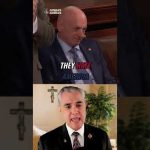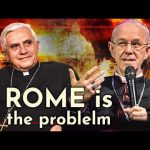When the Nazis occupied Rome for nine months following the fall of Mussolini, Monsignor Hugh O’Flaherty created what came to be known as the “Rome Escape Line.” / Patrick Leonard/EWTN
Vatican City, Oct 20, 2023 / 09:40 am (CNA).
Many people know Irish Monsignor Hugh O’Flaherty from Hollywood’s portrayal of his life in “The Scarlet and the Black,” the film based on a real-life Catholic hero who was honored at the Vatican this week.
Ireland’s President Michael Higgins in a Vatican ceremony on Oct. 19 paid tribute to O’Flaherty, an Irish priest who hid Italian Jews from the Nazis and went on to baptize the former head of the Gestapo in Rome.
When the Nazis occupied Rome for nine months following the fall of Mussolini, Monsignor Hugh O’Flaherty created what came to be known as the “Rome Escape Line.” Credit: Patrick Leonard/EWTN
The wreath-laying ceremony marked the 60th anniversary of O’Flaherty’s death on Oct. 30, 1963. The ceremony took place in the Vatican’s Teutonic Cemetery, where a plaque commemorates O’Flaherty as a “tireless defender of the weak and oppressed” who saved more than 6,000 lives during World War II.
Higgins praised the Irish priest for his “wonderful courageous work in the most terrible of times.”
“It took great courage and took great commitment and it was morally so striking that somebody did all of that for those threatened,” the Irish president told EWTN.
The wreath-laying ceremony on Oct. 19, 2023, marked the 60th anniversary of O’Flaherty’s death on Oct. 30, 1963. Credit: Patrick Leonard/EWTN
Born in County Cork in 1898, O’Flaherty grew up in Killarney playing golf on the course where his father worked as a steward before discerning his vocation to the priesthood.
As a seminarian, O’Flaherty studied theology in Rome at the Urban College of the Congregation for the Propagation of the Faith and went on to earn doctorates in both canon law and philosophy in Rome.
He was ordained to the priesthood in 1925 and became a Vatican diplomat, during which time he served in posts in Haiti, Egypt, and Czechoslovakia.
During World War II, O’Flaherty lived in the German College inside Vatican City State and worked at the Congregation for the Doctrine of the Faith, then known as the Holy Office.
The Holy See assigned O’Flaherty the task of visiting the Italian prisoner-of-war camps, where he brought books, cigarettes, chocolate, and hope to the English-speaking Allied prisoners, according to the Hugh O’Flaherty Memorial Society. After these visits, the priest used Vatican Radio to contact the prisoners’ relatives.
When the Nazis occupied Rome for nine months following the fall of Mussolini, O’Flaherty created what came to be known as the “Rome Escape Line” — a network of priests, diplomats, and expatriates in Rome who helped to hide more than 6,000 escaped Allied POWs and Jews in convents, monasteries, and residences.
Among those, O’Flaherty hid 50 people in his Vatican residence, the Pontifical Teutonic College, during the war years.
Secret meetings among members of the Rome Escape Line to exchange documents and information on safe houses took place inside St. Peter’s Basilica at the foot of Michaelangelo’s Pieta or near the Altar of the Chair, according to the Vatican.
After the liberation in Rome in 1944, the head of the German SS Herbert Kappler was sentenced in 1948 to life imprisonment in solitary confinement in Italy. O’Flaherty went to the prison to visit Kappler — who had previously threatened to torture and kill the Irish priest — every month for 10 years.
In 1959, O’Flaherty baptized Kappler and received the converted war criminal into the Catholic Church.
During his time in Rome, the Irish president also met with Pope Francis and Vatican Secretary of State Cardinal Pietro Parolin on Oct. 19, 2023, with whom he discussed issues of common interest, including “food security in developing countries and commitment to the elimination of poverty,” according to the Vatican. Credit: Vatican Media
With the opening of Vatican archives from the pontificate of Pius XII (1939–1958), historians have been further researching O’Flaherty’s life and legacy.
“In his native Kerry they are very very proud of this wonderful man that they produced at the heart of the Vatican who was able to do so much,” Higgins told EWTN.
“It is very appropriate that he be remembered and honored, and also that his example be repeated.”















